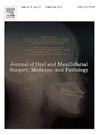Solitary circumscribed neuroma of the upper lip: A case report
IF 0.4
Q4 DENTISTRY, ORAL SURGERY & MEDICINE
Journal of Oral and Maxillofacial Surgery Medicine and Pathology
Pub Date : 2023-11-19
DOI:10.1016/j.ajoms.2023.11.009
引用次数: 0
Abstract
A solitary circumscribed neuroma is a benign peripheral nerve tumor with a predilection for the skin of the head and neck. Herein, we present a 73-year-old Japanese male with a solitary circumscribed neuroma of the upper lip. Histologically, the tumor comprised densely proliferating Schwann cells and axons that formed fascicles. A thin perineural-derived fibrous capsule surrounded the tumor. Immunohistochemically, the tumor cells were positive for S-100, and neurofilaments indicated the presence of nerve fibers. Fibrous capsules were identified by epithelial membrane antigen staining.
上唇单发环状神经瘤:病例报告
单发环状神经瘤是一种良性周围神经肿瘤,好发于头颈部皮肤。在此,我们介绍了一名患有上唇单发环状神经瘤的 73 岁日本男性。组织学上,肿瘤由密集增生的许旺细胞和轴突组成,形成束状。肿瘤周围有一层薄薄的神经周围纤维囊。免疫组化结果显示,肿瘤细胞的 S-100 阳性,神经丝表明存在神经纤维。上皮膜抗原染色可确定纤维囊。
本文章由计算机程序翻译,如有差异,请以英文原文为准。
求助全文
约1分钟内获得全文
求助全文
来源期刊

Journal of Oral and Maxillofacial Surgery Medicine and Pathology
DENTISTRY, ORAL SURGERY & MEDICINE-
CiteScore
0.80
自引率
0.00%
发文量
129
审稿时长
83 days
 求助内容:
求助内容: 应助结果提醒方式:
应助结果提醒方式:


